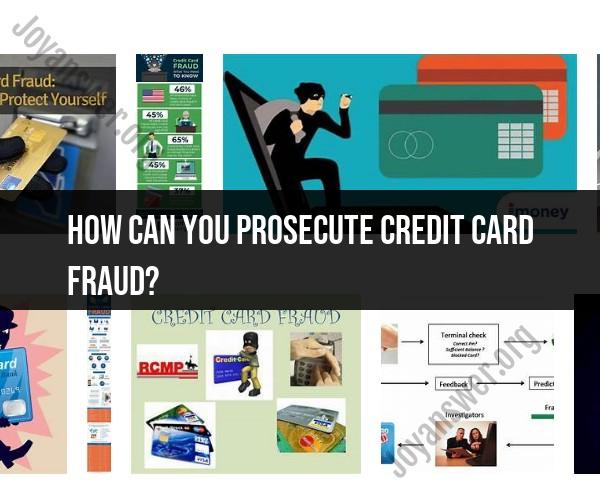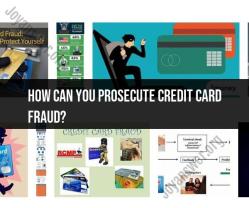How can you prosecute credit card fraud?
Prosecuting credit card fraud typically involves a coordinated effort between law enforcement agencies, financial institutions, and the legal system. The process can be complex due to the need to gather evidence, establish the elements of the crime, and ensure due process rights are upheld. Here are the general steps involved in prosecuting credit card fraud:
Report the Fraud:
- The first step in prosecuting credit card fraud is reporting the incident. This is typically done by the victim, the credit cardholder, or the financial institution that issued the card. Reporting the fraud promptly is crucial.
Investigation:
- Law enforcement agencies, such as the police or federal investigators, will conduct an investigation. They may collect evidence from the victim, the credit card company, and any other relevant sources.
Gather Evidence:
- Evidence collection is a critical part of the process. This may involve obtaining surveillance footage, transaction records, witness statements, and any other information that can establish the identity of the fraudster and the fraudulent transactions.
Establish the Elements of the Crime:
- To successfully prosecute credit card fraud, the prosecution must establish specific elements of the crime. These may include proving that:
- The defendant knowingly and intentionally used someone else's credit card without authorization.
- The defendant engaged in fraudulent transactions, such as making unauthorized purchases or withdrawals.
- The defendant had the intent to commit fraud or steal.
- To successfully prosecute credit card fraud, the prosecution must establish specific elements of the crime. These may include proving that:
Arrest and Charges:
- If there is enough evidence to support charges, law enforcement may arrest the suspect. The specific charges can vary based on the circumstances but often include credit card fraud, identity theft, or related offenses.
Legal Proceedings:
- The legal process begins with an arraignment, during which the defendant is informed of the charges against them. Subsequent court proceedings, including pre-trial hearings and a trial, may follow if the case is not resolved through a plea agreement.
Trial or Plea Negotiations:
- In some cases, the defendant may choose to enter into plea negotiations with the prosecution, which can result in a plea deal where the defendant agrees to plead guilty to certain charges in exchange for a reduced sentence. If no agreement is reached, the case proceeds to trial.
Trial and Sentencing:
- If the case goes to trial, the prosecution and defense present their evidence and arguments, and a judge or jury determines the defendant's guilt or innocence. If found guilty, the defendant is sentenced based on the severity of the offense and any applicable sentencing guidelines.
Restitution:
- In many credit card fraud cases, the court may order the defendant to pay restitution to the victim or the credit card issuer to compensate for financial losses resulting from the fraud.
Appeals:
- If the defendant is convicted, they may have the right to appeal the verdict or sentence.
It's important to note that the exact process may vary depending on the jurisdiction and the specific circumstances of the case. Additionally, credit card fraud can take many forms, including card-not-present fraud (online transactions) and card-present fraud (in-person transactions), each of which may involve different investigative methods and legal considerations. Prosecuting credit card fraud requires a thorough understanding of the law, evidence collection, and legal procedures. Therefore, it's crucial to work closely with law enforcement agencies and legal professionals to ensure a successful prosecution.


